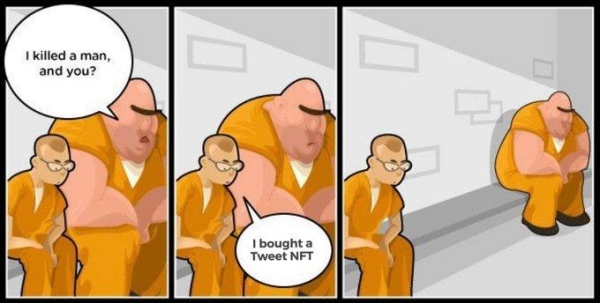NFT have big problems
And that makes me happy.

Non Fungible Tokens, or NFTs for short, are strings of digital bits Short for “linked to the blockchain”, the digital database underpinning cryptocurrencies such as bitcoin and ethereum.
They are mostly used, as CNN explains, to “assign a value to objects that often exist only in the virtual world, [which makes of NFTs] a huge boon for digital artists in particular”. This because, says the NFT gospel, “NFTs transform digital works of art and other collectibles into one-of-a-kind, verifiable assets that can be traded on the blockchain."
Theoretically, that is. Yes, there has been a digital artist who sold an NFT for more than $69 million. At the same time, as CNN reports,
“Earlier this month, Corbin Rainbolt, a budding digital artist who frequently shares his work on Twitter, found at least two of his pieces being sold as NFTs without his consent. He blocked the NFT accounts he found, but doesn’t know if there are more out there."
The problem here is painfully obvious
As a side note, please do note that… "[e]ven before his artwork was compromised, Rainbolt had a more fundamental problem with NFTs: “My view is that if you are participating in NFTs, you are disproportionately profiting from an ecological collapse” (ME: at least with almost all the current implementations of blockchains and cryptocurrencies).
But that is another issue. Carbon footprints aside, what should be painfully obvious with the intended way of working of NFTs is that:
- anyone can claim a digital photo or painting as their own by attaching a token to it, even if they didn’t create it
- while putting “stuff” in the blockchain does have concrete effects in the physical world, the fact that it is immutable and without a centralized controller “makes it much harder to get recourse if your work is stolen or compromised”, because “every transaction is effectively permanent - even those that are effectively theft”. Besides, being digital strings, “NFTs are just as potentially hackable as your email or any other online account”.
Translation of this whole sad story:
- “property” of anything that can be perfecly, automatically, endlessly copied is a troublesome concept to begin with
- stuff like the blockchain could be used to certify autorship. NOT to certify property, and even less to enforce it:
- there still is only one world that matters, and one set of laws that matter
ABOVE ALL, please note that this is not limited to art at all: by its own nature any blockchain can only assume, as the CNN piece puts it, that “whoever creates - or “mints” - an NFT is the original creator of the attached artwork." But this is true for whatever is attached to a blockchain, be it the “ownership” of a digital image, the origin of tuna or the quality of mangoes.
Image source: NFT and crypto jokes
Who writes this, why, and how to help
I am Marco Fioretti, tech writer and aspiring polymath doing human-digital research and popularization.
I do it because YOUR civil rights and the quality of YOUR life depend every year more on how software is used AROUND you.
To this end, I have already shared more than a million words on this blog, without any paywall or user tracking, and am sharing the next million through a newsletter, also without any paywall.
The more direct support I get, the more I can continue to inform for free parents, teachers, decision makers, and everybody else who should know more stuff like this. You can support me with paid subscriptions to my newsletter, donations via PayPal (mfioretti@nexaima.net) or LiberaPay, or in any of the other ways listed here.THANKS for your support!